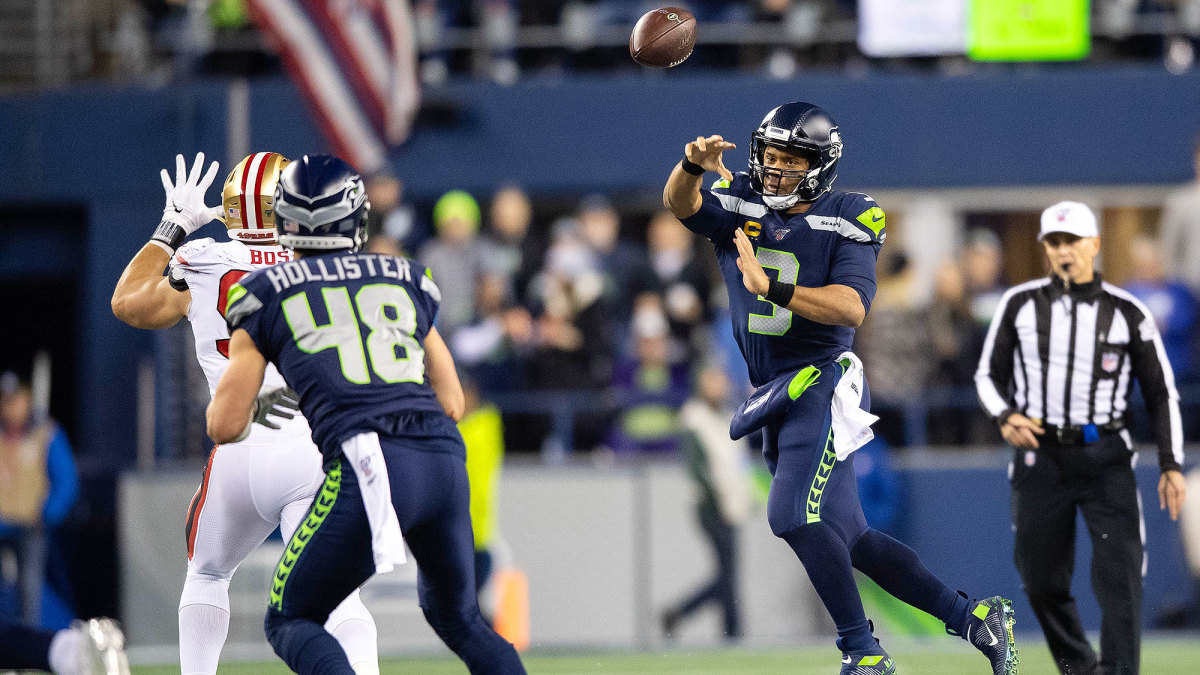A Familiar Culprit—a Lack of Pass Interference Review—Robbed Us of the Perfect Ending in 49ers-Seahawks


Take a moment and let the dizzying euphoria of that game wear off.
Seattle-San Francisco was an NFL special; a game dripping with narratives and drama; an unload-the-chamber grand finale closer to that of a reckless firework show than a football game. It bookended their 100th regular season, which should send the league soaring into the postseason fat and happy.
Amid the sensory overload, it’s convenient that we’ll probably gloss over what was yet another horrendous attempt—or lack thereof—to properly legislate pass interference at the most critical moments of big games. This, despite an entire offseason devoted to ensuring that such a thing never happens again. As we creep toward the one-year anniversary of the non-PI call in New Orleans that changed football forever, are we any closer to actually fixing the problem?
With 42 seconds remaining Sunday, Seattle had the ball on the 49ers’ 12-yard line on fourth-and-10. Russell Wilson rolled to his right and buzzed a pass to wide receiver John Ursua at the two-yard line. Without any timeouts, the Seahawks reset themselves and spiked the ball with 22 seconds remaining. A sideline miscommunication resulted in an incorrect personnel grouping, which caused a delay of game penalty pushing the ball back to the seven-yard line for second-and-goal.
On that play, Wilson comes out in an empty set and nearly throws an interception on a lobbed pass to Tyler Lockett. The ball is bobbled by 49ers’ safety Marcell Harris and spilled out of bounds, setting up the critical third-and-goal from the seven.
Here, Seattle comes out in a similar personnel grouping and tight end Jacob Hollister runs a route that resembles the one he ran on the play before. This time, Wilson throws the ball fairly quickly when he sees Hollister getting blanketed aggressively in the end zone by 49ers linebacker Fred Warner. As he’s prone to do, Wilson is excellent at identifying blatant pass interference and can capitalize on the infraction by spotlighting the issue. Warner begins to make contact about seven yards into the route, right on the goal line, by grabbing Hollister by his left shoulder and right shoulder blade. For a moment, the bear hug sees about half of the nameplate on Hollister’s jersey covered by a defender’s hand.
When the ball arrives, one of Hollister’s hands, and the opposite shoulder both appear to be pressed down by Warner, which doesn’t allow the tight end to put his hands up to catch the pass.
Amid a cacophony of boos from the home crowd, Hollister throws his hands up in disbelief. Terry McAulay, a 20-year official who now serves as Sunday Night Football’s rules analyst, is brought in to analyze the play and offers this:
“He’s clearly got him grabbed. Significantly hindering the receiver. This should be a booth review. I’m surprised they haven’t stopped the game.”
NFL Senior VP of Officiating Al Riveron said the play was reviewed in New York, but they didn’t see enough that warranted stopping the game, per pool reporter Tim Booth.
“We see the offensive player come in and initiate contact on the defensive player—nothing that rises to the level of a foul that which significantly hinders the receiver, nothing that is clear and obvious through visual evidence, which hinders the defender.”
We all know what happens next. Wilson throws to Hollister on fourth down, he’s stopped an index card-length from the goal line and we all wobble out of the game like a satiated bar patron none the wiser.
What a game.
Except for the part where triggering pass interference potentially gives us a chance to see Marshawn Lynch exorcize one of the worst offensive play calls in NFL history and punch the ball in for a game-winning score in his return to Seattle. At the least, it is Beast Mode against the league’s most feared defensive line on a collision course for the NFC West title.
Except for the part where a Seahawks touchdown completely reshapes the NFC playoff picture and hands the New Orleans Saints a first-round bye instead of a game against the Vikings (the continued irony that Sean Payton is haunted by pass interference and his resulting efforts to fix it won’t be lost on him).
Except for the part where an officiating crew sat on its hands despite the technology and authority at their disposal to fix the issue, or at least look at it. Perhaps this crew would decide that what Warner did failed to rise to the level of egregiousness needed to overturn a call. But to not even review it?
Question or comment? Email us at talkback@themmqb.com.
